Contents
i Cubas Forgotten Decade
ii Lexington Studies on Cuba
Series Editors: John M. Kirk, Dalhousie University, and Mervyn Bain, University of Aberdeen
This series will publish texts on all aspects of Cuba, focusing on the post-1959 period. It seeks to be truly interdisciplinary, with studies of all aspects of contemporary Cubafrom foreign policy to culture, sociology, to economics. The series is particularly interested in broad, comprehensive topics (such as women in Cuba, economic challenges, human rights, the role of the media, etc.). All ideological positions are welcomed, with solid academic quality being the defining criterion. In exceptional circumstances edited collections will be considered, but the main focus is on high quality, original, and provocative monographs and innovative scholarship.
Recent Titles in This Series
Cubas Forgotten Decade: How the 1970s Shaped the Revolution
Edited by Emily J. Kirk, Anna Clayfield, and Isabel Story
Everyday Adjustments in Havana: Economic Reforms, Mobility, and Emerging Inequalities
By Hope Bastian
Cubas Gay Revolution: Normalizing Sexual Diversity Through a Health-Based Approach
By Emily J. Kirk
iii Cubas Forgotten Decade
How the 1970s Shaped
the Revolution
Edited by
Emily J. Kirk, Anna Clayfield, and
Isabel Story

iv Published by Lexington Books
An imprint of The Rowman & Littlefield Publishing Group, Inc.
4501 Forbes Boulevard, Suite 200, Lanham, Maryland 20706
www.rowman.com
Unit A, Whitacre Mews, 26-34 Stannary Street, London SE11 4AB
Copyright 2018 The Rowman & Littlefield Publishing Group, Inc.
All rights reserved . No part of this book may be reproduced in any form or by any electronic or mechanical means, including information storage and retrieval systems, without written permission from the publisher, except by a reviewer who may quote passages in a review.
British Library Cataloguing in Publication Information Available
Library of Congress Cataloging-in-Publication Data Is Available
ISBN 978-1-4985-6873-9 (cloth: alk. paper)
ISBN 978-1-4985-6874-6 (electronic)
 The paper used in this publication meets the minimum requirements of American National Standard for Information SciencesPermanence of Paper for Printed Library Materials, ANSI/NISO Z39.48-1992.
The paper used in this publication meets the minimum requirements of American National Standard for Information SciencesPermanence of Paper for Printed Library Materials, ANSI/NISO Z39.48-1992.
Printed in the United States of America
v Contents
Antoni Kapcia
Mervyn Bain
H. Michael Erisman
John M. Kirk
Anna Clayfield
Robert Huish
vi
Emily J. Kirk
Hope Bastian Martnez
Rosi Smith
Isaac Saney
Par Kumaraswami
Isabel Story
Guy Baron
Raquel Ribeiro
Anne Luke
vii List of Acronyms
| ALBA | Bolivarian Alliance for the Peoples of Our America (Alianza Bolivariana para los Pueblos de Nuestra Amrica) |
| ANAP | National Association of Small Farmers (Associacin Nacional de Agricultores Pequeos) |
| CDR | Committees for the Defense of the Revolution (Comits de Defensa de la Revolucin) |
| CENESEX | National Center of Sexual Education (Centro Nacional de Educacin Sexual) |
| CNC | National Council of Culture (Consejo Nacional de Cultura) |
| CODEMA | Advisory Council for the Development of Monumental Sculpture (Consejo Asesor para el Desarrollo de la Escultura Monumentaria) |
| COMECON | Council for Mutual Economic Assistance |
| CTC | Workers Central Union of Cuba (Central de Trabajadores de Cuba) |
| ELAM | Latin American School of Medicine (Escuela Latinoamericana de Medicina) |
| ESBEC | Basic Rural Secondary Schools (Escuelas Secundarias Basicas en el Campo) |
| FAPLA | Peoples Armed Forces of Liberation of Angola (Foras Armadas Populares de Libertao de Angola) |
| FAR | Cuban Armed Forces (Fuerzas Armadas Revolucionarias) |
| FLQ | Quebec Liberation Front (Front de libration du Qubec) |
| FMC | Federation of Cuban Women (Federacin de Mujeres Cubanas) |
| FNLA | National Front for the Liberation of Angola (Frente Nacional de Libertao de Angola) |
| viii FNSN | National Federation of Black Societies of Cuba (Federacin Nacional de Sociedades Negras) |
| GNTES | National Group for Work on Sexual Education (Grupo Nacional de Trabajo de Educacin Sexual) |
| ICAIC | Cuban Institute of Cinematographic Arts and Industry (Instituto Cubano del Arte e Industria Cinematogrficos) |
| ILL | Institute of Linguistics and Literature (Instituto de Lingstica y Literatura) |
| ISA | Higher Arts Institution (Instituto Superior de Arte) |
| MINCULT | Ministry of Culture (Ministerio de Cultura) |
| MINED | Ministry of Education (Ministerio de Educacin) |
| MINFAR | Ministry of the Revolutionary Armed Forces (Ministerio de las Fuerzas Armadas Revolucionarias) |
| MINSAP | Ministry of Public Health (Ministerio de Salud Pblica) |
| MPLA | Popular Movement for the Liberation of Angola (Movimento Popular de Libertao de Angola) |
| NATO | North Atlantic Treaty Organization |
| OPP | Organs of Peoples Power (rganos del Poder Popular) |
| PCC | Cuban Communist Party (Partido Comunista de Cuba) |
| PGI | General Comprehensive Teachers (Profesores Generales Integrales) |
| PSP | Popular Socialist Party (Partido Socialista Popular) |
| SDPE | System Management and Planning of the Economy (Sistema de Direccin y Planificacin de la Economa) |
| UJC | Young Communist League (Unin de Jvenes Comunistas) |
| UNEAC | Writers and Artists Union of Cuba (Unin de Escritores y Artistas de Cuba) |
| UNITA | National Union for the Total Independence of Angola (Unio Nacional para a Independncia Total de Angola) |
| USSR | Union of Soviet Socialist Republics |
Introduction
Cubas Forgotten Decade
Cuba in the 1970s was a very different place to the Cuba of the 1960s. Gone was the open and polemical debates that raged across all spheres of life, the erratic forming of social institutions which arose empirically. Gone too, argued many, was the idealism. By the 1970s the need for a fundamental reassessment of the path to independence had become urgent. The revolutionary government felt increasingly isolated as previously natural alliesgeographically or politicallyseemed to move ever further away, compounded by the atomizing nature of the Cold War. Thus began a new phase of the Revolution which sought to find new answers to old problems, and which also included some pragmatic solutions to perennial issues to allow for longer-term planning. One of these solutions included a closer and deeper alliance with the Soviet Union and the Socialist Bloc, particularly in the fields of economy, education, and the military. Cuba joined the Council for Mutual Economic Aid (COMECON) as a full member in 1972 and trade with the organization swiftly came to account for the majority of Cubas foreign commerce. This shift in economic collaboration seemed to imply a change in policy and therefore a prioritization of a particular strand of socialism.

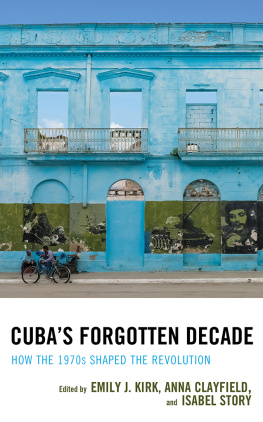
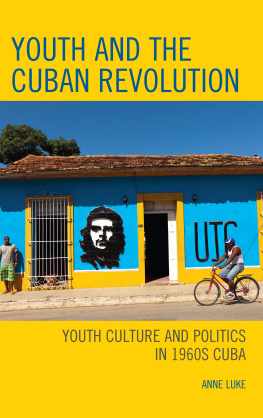

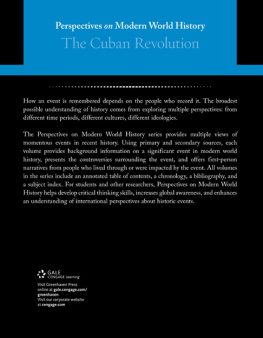

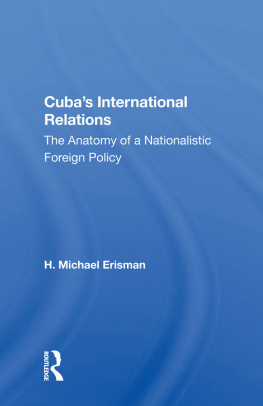
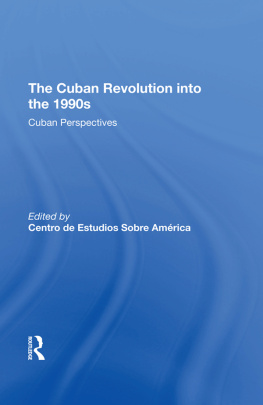
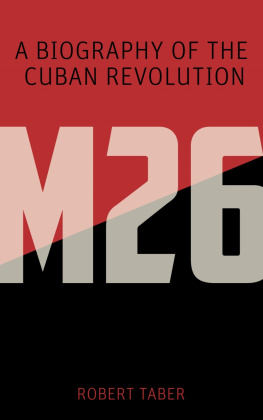

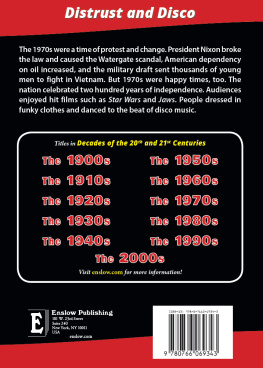
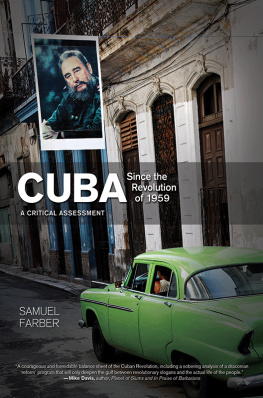


 The paper used in this publication meets the minimum requirements of American National Standard for Information SciencesPermanence of Paper for Printed Library Materials, ANSI/NISO Z39.48-1992.
The paper used in this publication meets the minimum requirements of American National Standard for Information SciencesPermanence of Paper for Printed Library Materials, ANSI/NISO Z39.48-1992.